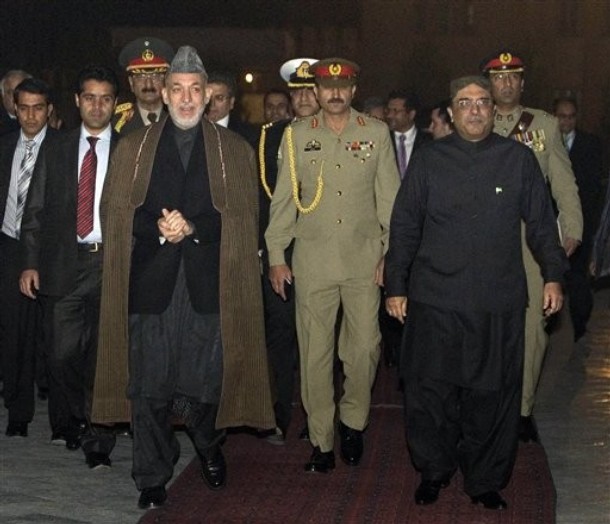Why Are We in Afghanistan?
Why America can't bring peace to India and Pakistan.

Joe Klein offers an answer:
Let's start with a fact: the Indian Embassy in Kabul has suffered major, lethal bomb attacks twice in the past two years. There is little question in the intelligence community that these attacks were staged by terrorist allies of the Pakistani Army. The Pakistanis are absolutely convinced that if the U.S. leaves Afghanistan, India will jump in, supporting the non-Pashtun elements in the country--indeed, India was a supporter of the Northern Alliance's guerrilla war against the Taliban in the 1990s (although, it must be said, the Pakistanis have a rather exaggerated sense of Indian involvement).Why is this a problem we should care about? Because India and Pakistan both have nuclear weapons. Because tensions between the two countries would escalate dramatically if we were to abandon the region. And, most important, because our departure would empower the more radical elements of the Pakistani military and intelligence services--not merely in their support of the Taliban, but also, potentially, in their ability to stage an Islamist coup d'etat. This is the worst scenario imaginable: a nuclear Pakistan, with allies of Osama Bin Laden controlling the trigger.
I think it's obvious that along the spectrum of "bad to worse" we could still progress a lot further toward "worse" in Pakistan, as Klein argues. But there are several problems with this analysis. First, Pakistan and India have had nuclear weapons before the U.S. presence in Afghanistan. They have fought wars before the U.S. arrived and indeed, were on the brink of fighting another shortly after we invaded Afghanistan. There is nothing about our presence there that ensures peace and nothing about our departure that guarantees war. Moreover, Pakistan and India have been quietly working on a peace deal for years now, work that began, I believe, without American supervision or goading.
The second point, about an Islamist coup-d'etat is also dubious. Not that such an event couldn't occur, obviously it could. But I'm not sure why 100,000 troops inside Afghanistan is preventing that. They're not providing palace security for Zardari. If anything, constant U.S. drone attacks in the tribal zone and the incessant, public brow-beating of Pakistani officials by Americans to take the war to their own citizens could just as easily inspire a coup against a government seen as overly solicitous to America.
It's also worth stepping back and turning the problem around: if I understand Klein correctly, our strategic decisions are essentially hostage to what a few Islamist Pakistani military officers may or may not do with respect to the Afghan Taliban and their own government. Under that logic, we can never leave. And it's also worth noting that despite our massive presence in the region, Pakistan is not behaving itself:
Demands by the United States for Pakistan to crack down on the strongest Taliban warrior in Afghanistan, Siraj Haqqani, whose fighters pose the biggest threat to American forces, have been rebuffed by the Pakistani military, according to Pakistani military officials and diplomats.
The regional dynamics are clearly working against us. Where I part company with Klein is with the notion that we can fix them.
(AP Photos)





